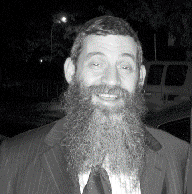The Jewish Week - Crown Heights JCC Leader Sued
 Board members say chairman owes council millions; Rubashkin claims row is over bet din.
Board members say chairman owes council millions; Rubashkin claims row is over bet din.Adam Dickter - Staff Writer
A state court in Brooklyn is weighing whether to require the chairman of the Crown Heights Jewish Community Council to turn over financial records to his officers after two directors alleged that he has misdirected funds for personal gain.
But Rabbi Moshe Rubashkin emphatically denies the charges, insisting 'not a dollar, not 50 cents, not a penny' was misused. And at least one communal leader says the charges appear 'baseless.'
Judge Francois Rivera of state Supreme Court earlier this month called on Rabbi Rubashkin to show why an order should not be issued by the court requiring him to open the books. The motion also prevented the installation of three rabbis to a bet din whose election on April 30 is in dispute.
The two board members, Hanina Sperlin and Leibish Nash, want Rabbi Rubashkin to give up financial control of the council and pay at least $18 million to the organization.
A hearing in the case was scheduled for Monday but postponed until June 19 before Judge Michael Ambrosio, at which time the rabbi will have to explain why he should not have to show the records to the plaintiffs.
The case reveals a hefty power struggle within the tangled web of secular social service and religious organizations that controls life in the Crown Heights chasidic community, whose numbers are estimated at about 10,000. Thousands more adherents who look to Crown Heights for guidance are spread across the globe.
Rabbi Rubashkin’s election to the helm of the JCC, which disburses public and private money to those eligible for social programs while also funding neighborhood projects, drew some controversy in January 2005, because he had served 15 months in a federal prison two years earlier for writing bad checks to cover expenses for his failing textiles business.
He was nevertheless elected with more than 70 percent of 1,200 votes cast, more than the others on the slate. His supporters later said he would not be directly involved in the JCC’s finances.
But Sperlin and Nash allege that not only is he involved but “it appears that Rubashkin has used JCC funds for his own self-interest and personal expenses” while refusing to open the books to other trustees and bypassing other officers, according to court papers.
No details are provided in court papers about the alleged misdirection of funds. The plaintiffs are seeking “at least $18 million” to be repaid to the JCC, according to court papers, although the same papers elsewhere note that the organization’s assets are around $2 million.
“We are afraid his actions could affect the city’s funding to the JCC,” said the plaintiffs’ lawyer, Howard Rubin.
Rubin told The Jewish Week the suit was brought because Rabbi Rubashkin “unilaterally” scheduled an election to fill a vacancy on the communal bet din through a process that violated the JCC’s mandates, in the view of the plaintiffs.
“The clients came to us and said this is not according to bylaws and rules and successfully got a temporary restraining order preventing the certification of the election,” said Rubin. “In the course of an investigation we found out Rubashkin was using the letterhead of the JCC as if the election was approved by the JCC or the Vaad Hakohol.
”The Vaad Hakohol is the JCC’s religious arm, which carries out the elections of the bet din.
In an interview from Israel, where he was visiting his son this week, Rabbi Rubashkin spoke in great detail about the case, insisting the true aim of the plaintiffs was to prevent the installation of the rabbis to the bet din. He said he did not know why the plaintiffs opposed the rabbis.
“I don’t understand what they are trying to do,” he said. “They are coming at me from every which way. This isn’t about Moshe Rubashkin. What they really want in court is to stop the rabbanim [rabbis] from becoming rabbanim. That’s what they’re looking to stop.” He stressed that a vibrant communal bet din, which would interpret the teachings of the late Rebbe Menachem Schneerson, was imperative in a movement that dispatches thousands of emissaries throughout the world.
Of his past indiscretions, Rabbi Rubashkin said “I made a mistake in my life and paid a very heavy price for it, but paying the price doesn’t mean you are killed. Last year 450 people went to camp [thanks to the JCC], we gave out money like never before in the history of the JCC.” He added that he receives no compensation for his work with the council. He also insisted that the council’s books must be examined by government audits. “As long as you take any money from the government you must certify the books every year.
”The JCC is affiliated with the Metropolitan Council on Jewish Poverty, which administers some of its programs, such as Child Health Plus and job training and prepares the payroll of employees who work on those programs, although it does not directly fund the JCC.
Met Council’s director, William Rapfogel, said his inquiries into the matter suggest personality clashes were mostly to blame for the strife.
“We’re always concerned about any kind of allegations,” he said. “But based on initial discussions these seem to be baseless charges purely based on disagreements within the community. They have to do with a bigger machlokes [conflict], which has nothing to do with the provision of social services.
”Rabbi Rubashkin’s critics object to his spending thousands of dollars on an outside firm, Election Services Corporation, to certify the results of the election. The rabbi says the sum was about $15,000. He said the expense was justified to ensure that the results would not be questioned. But, in the court papers, the plaintiffs, who named Long Island-based Election Services Corporation a co-defendant in the suit, claim the election was not carried out in accordance with Vaad Hakohol guidelines, which require, among other things, that the tallying of results be videotaped. The lawsuit claims the company certified the election “notwithstanding the fact that it was informed that the election was not performed properly.
”Election Services Corporation, as of Tuesday, did not respond to a call and e-mail message seeking comment.
The lawsuit also claims that Rabbi Rubashkin held a meeting in his home last month to appoint new members of the JCC board — members who would support his stewardship — and that meeting violated the group’s bylaws. But the rabbi said his election was held to address violations of bylaws in the last election in September.
Marcia Eisenberg of the Jewish Legal Assistance Program, a division of the Jewish Community Relations Council that advises nonprofits, said she had been consulted on the dispute and had informed both sides that they had not conformed with JCC bylaws. She said the April meeting was likely held too far after the initial election to supersede it.
“If they did everything they say they did and adhered to the bylaws, the question is was it legitimate because it was done in April,” said Eisenberg.
Yankel Wice, a member of the JCC’s synagogue advisory council who supports Rabbi Rubashkin, said he “strongly doubts” the rabbi did anything improper.
“He has done things like provide clothing and housing for yeshiva boys and girls on Passover and helped with summer camp tuition and a lot of social programs, often using the monies that the council has,” said Wice. He insisted Rabbi Rubashkin had provided some accounting of the finances, if not to the level sought by his detractors. “What the plaintiffs in this case are seeking is every single record, every petty cash [receipt] and check stub. I am not aware of any organization that is required to provide that level of specificity.”


